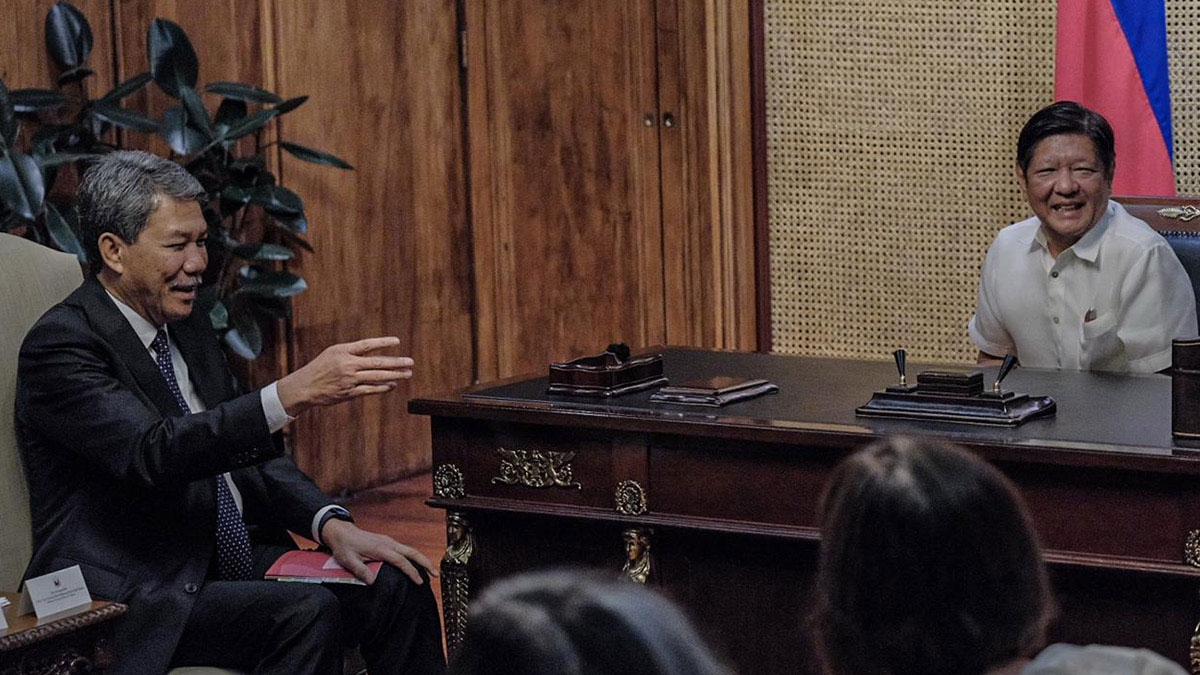
WARM TIES Malaysian Foreign Minister Dato’ Seri Utama Haji Mohamad Bin Haji Hasan at a courtesy call to President Marcos on July 1. —PPA POOL
The Philippines continues to explore opportunities for trade expansion and is looking closely at making the halal industry a new growth area.
Aleem Siddiqui Guiapal, program manager for Industry Development and Investment Promotion of the Department of Trade and Industry, points out that “every success in trade [is a] boost to [Filipino] farmers and workers.”
As the country relies heavily on trade and foreign investment, there is every reason to explore the potential of halal products as major export commodities.
Halal means permissible or lawful in Islam. Although used especially to refer to dietary restrictions, it can be broadly applied to any activity or object.
“There is a growing demand for halal-centered products,” Guiapal says, “not just in food but also other things, like cosmetics.”
The Philippines, he notes, has the third-largest Muslim population among the 10 member countries of the Association of Southeast Asian Nations (Asean), but it does not have any farm for halal production.
The country is looking toward neighbor and fellow Asean member Malaysia for lessons on how to grow the halal industry.
Guiapal was among the speakers in the recent forum “60 Years of Malaysia-Philippines Relations: Deepening Cooperation in a Dynamic World.” Organized by the Embassy of Malaysia in Manila, in collaboration with the University of the Philippines (UP), the forum not only celebrated six decades of Philippine-Malaysia friendship but also served as a pre-event to Malaysia’s assumption as chair of Asean in 2025.
Intan Zalani, also part of the panel discussion on “Enhancing Malaysia-Philippines Relations,” says the Philippines has made “significant strides in promoting and developing the halal industry.”
Zalani, trade attaché of the Embassy of Malaysia in the Philippines, cautions that, while Malaysia has achieved considerable success in growing and promoting its halal products, the way forward was not easy.
But she encourages efforts to grow the halal industry as she points out that the global Muslim population is expected to reach 2 billion. Moreover, even non-Muslims are patronizing halal products, which now include more than the traditional foodstuff.
Ariel Lopez, associate professor at UP Asian Center, reports that old handwritten letters show that relations between the two countries existed even when the Philippines was a Spanish colony. Malaysian rulers were communicating with Filipino sultans and even with the colonizers themselves.
Regional bloc
In the first panel discussion, “Gearing toward Malaysia’s Chairmanship of Asean: Opportunities and Challenges,” Dato’ Mohd Suhaimi Jaafar, undersecretary of the High-Level Task Force on Asean Community’s Post-2025 Vision, stresses that the regional alliance “must have the ability to shape its own destiny.”
He adds that the region’s “peoples should be the ultimate beneficiaries” of Asean initiatives.
Joefe Santarita, Asian Center college secretary, says Asean chairmanship has the potential to strengthen the rule of law and mechanisms on conflict prevention and dispute resolution.
Cooperation between Malaysia and the Philippines in the prevention and solution of crimes, like smuggling, human trafficking and piracy, is underscored by Aaron Jed Rabena, assistant professor at the Asian Center.
Noel Christian Moratilla, Asian Center dean, gave the welcome remarks while Dato’ Abdul Malik Melvin Castelino, Malaysia’s ambassador to the Philippines, formally opened the forum.
The forum sought to highlight the deep ties between Malaysia and the Philippines and their mutual commitment to regional unity. It also aimed to provide an opportunity for a dialogue on mutual strategic goals and underscore the importance of the two countries’ collaboration in facing current challenges.
Aside from Malaysia and the Philippines, Asean also includes Brunei Darussalam, Cambodia, Indonesia, Lao People’s Democratic Republic, Myanmar, Singapore, Thailand and Vietnam. —Contributed INQ